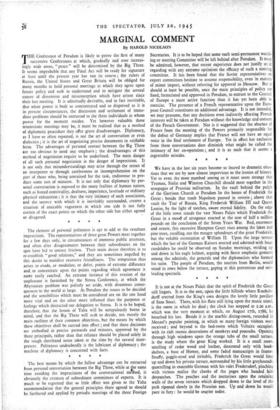MARGINAL COMMENT
By HAROLD NICOLSON
THE Conference of Potsdam is likely to prove the first of many successive Conferences at which, gradually and over increas- ingly wide areas, " peace " will be determined by the Big Three. It seems improbable that any Final Act will be ready for signature at least until the present year has run its course ; the rulers of Russia, the United States and Great Britain will be obliged for many months to hold personal meetings at which they agree upon future policy and seek to understand and to mitigate the several causes of dissension and misconception which have arisen since their last meeting. It is admittedly desirable, and in fact inevitable, that when power is both so concentrated and so dispersed as it is in present circumstances, the discussion and settlement of imme- diate problems should be entrusted to the three individuals in whom power for the moment resides. Yet however valuable these triumvirate meetings may be, it must be realised that as a method of diplomatic procedure they offer grave disadvantages. Diplomacy, as I have so often repeated, is not the art of conversation or even dialectics ; it is the art of negotiating precise documents in ratifiable form. The advantages of personal contact between the Big Three are too obvious to need any emphasis ; the disadvantages of this method of negotiation require to be underlined. The main danger of all such personal negotiation is the danger of imprecision. It is not only that misunderstandings may arise through the errors of an interpreter or through carelessness or incomprehension on the part of those who, being untrained for the task, endeavour to pro- duce some sort of minutes. It is not only that diplomacy by per- sonal conversation is exposed to the many frailties of human nature, such as forced conviviality, deafness, impatience, lassitude or ordinary physical exhaustion ; it is that the very intimacy of such association, and the secrecy with which it is inevitably surrounded, creates a situation of amicable vagueness in which one side is not fully certain of the exact points on which the other side has either agreed or disagreed.


























 Previous page
Previous page